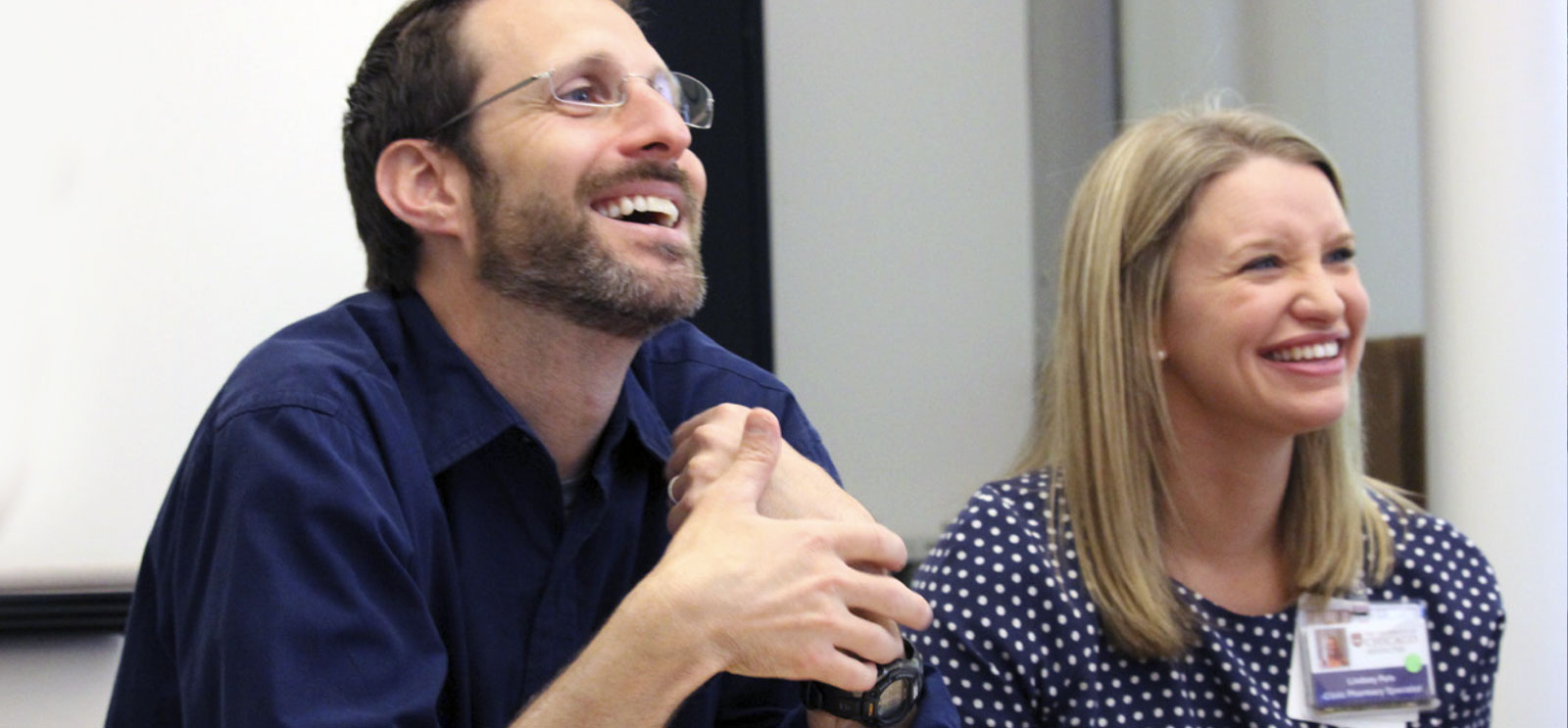
Andrew Aronsohn leads an ECHO-Chicago telehealth session about hepatitis C with transplant pharmacist Lindsey Pote. (Photography by Sara Serritella, courtesy University of Chicago Institute for Translational Medicine)
A UChicago Medicine program shares specialized knowledge to improve health care in the city.
For many Chicagoans, access to specialized medical care is “a substantial problem,” says Daniel Johnson, LAB’73, academic pediatrics section chief at the University of Chicago Medicine. Specialists are rare in low-income neighborhoods, and long travel times, high costs, and “ungodly long” waits can make it impractical or impossible for patients referred to an endocrinologist or infectious disease specialist to get the care they need. “And what do patients do now who can’t get access to the subspecialists in a timely way or at all?” asks Johnson. “They deteriorate, they go to the emergency room, they get hospitalized.”
Six years ago his colleague Tamara Hamlish, AM’87, PhD’95, heard about a program called Extension for Community Healthcare Outcomes (ECHO) run by the University of New Mexico. ECHO aims to improve access to subspecialty care in rural areas by training community providers to handle more complex cases themselves. Using videoconferencing technology, specialists can efficiently provide education on topics like hepatitis C or palliative care to community doctors who otherwise would not have the time or resources to pursue such training. “I said that it would be perfect for us to initiate here on the South Side of Chicago,” recalls Johnson.
The University of Chicago Medicine’s Urban Health Initiative soon launched the nation’s first urban iteration of the ECHO program. The rural model was modified slightly to meet the needs of busier inner-city providers; for example, all ECHO-Chicago videoconferencing sessions start at 8 a.m. because “that’s when they have the most control over their workday,” says Johnson. But at its core, ECHO-Chicago, like the original program, draws on a tried-and-true model of medical education: rounding. During each session, a UChicago Medicine expert gives a short lesson, and then community providers present cases that are discussed as a group during the videoconference. “And that’s basically the model medical education has shown to work the best,” says Johnson. “That’s how we train residents.”
The initial focus of ECHO-Chicago was resistant hypertension, or uncontrolled high blood pressure—the condition ECHO-Chicago’s community health center partners had cited as their biggest area of concern. Johnson and Hamlish, now ECHO-Chicago’s director and executive director, respectively, recruited George Bakris, AM’75, director of the University of Chicago Medicine’s comprehensive hypertension center, as the program’s first subject-matter expert to lead the virtual rounds. A preliminary review of the patients managed by ECHO-Chicago–trained community providers showed improved patient outcomes at partner sites—after taking the course, participating doctors were bringing about half of their resistant hypertension patients under control, a success rate equivalent to what had been seen in Bakris’s own clinic.
What’s more significant, Johnson says, is that an early analysis showed a 10 to 15 percent change in the type of hypertension prescriptions written by the ECHO-Chicago participants. The change seems small, he says, but it would mean ECHO-Chicago is “one of the first groups to ever show a change in provider behavior as the result of a continuing medical education intervention.”
The ECHO-Chicago program, with the support of grant funding and partnerships with the Centers for Disease Control and Prevention and other public and private organizations, has expanded to offer free curricula on child and youth epilepsy, hepatitis C, childhood obesity, women’s health care, and pediatric attention-deficit/hyperactivity disorder. A course on integrated mental and behavioral health is in the works. To date, more than 300 providers from 26 health care organizations have participated.
For Johnson, a South Side native who has spent most of his career working in low-income areas, ECHO-Chicago presents a workable way to raise the quality of available care in underserved communities. He’s encouraged that the ECHO model is now being used across the country, including major cities like Boston and Los Angeles. “It’s our belief, and we think we’re beginning to prove, that you can uptrain primary care providers to be able to handle more common complex chronic conditions,” says Johnson, “and that should significantly improve the health care of a large group of patients.”
